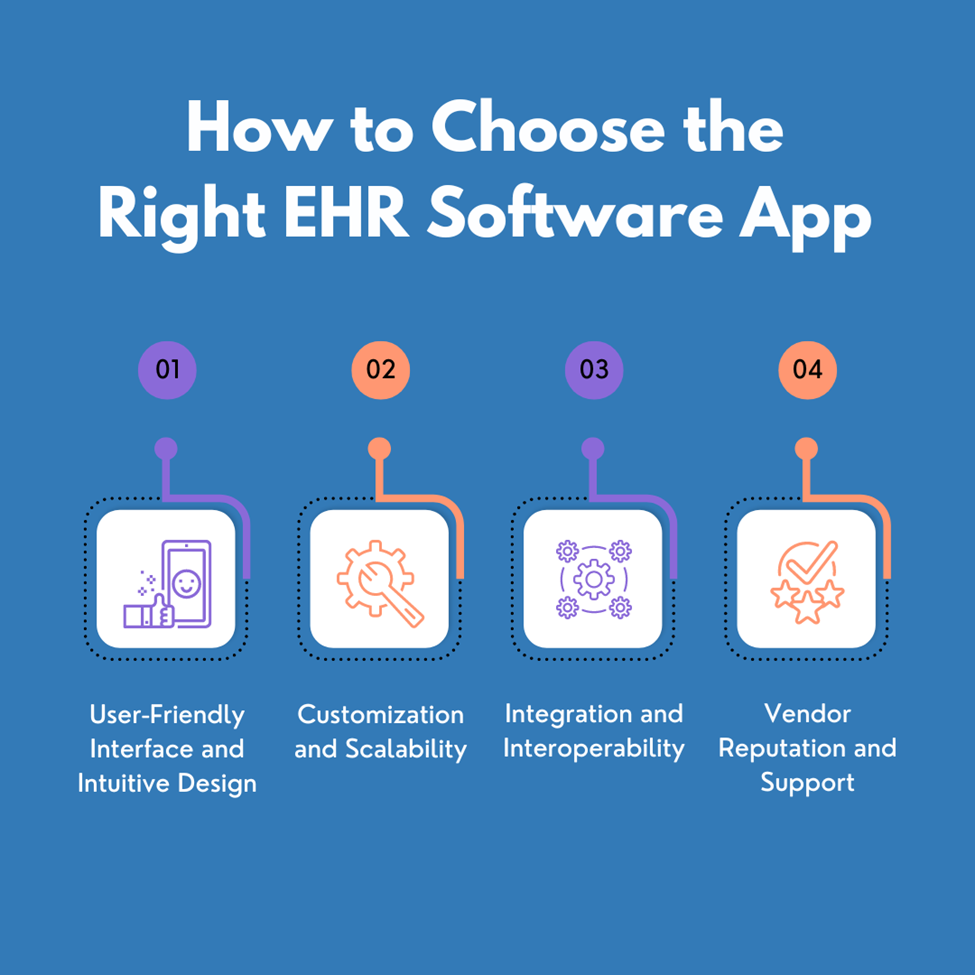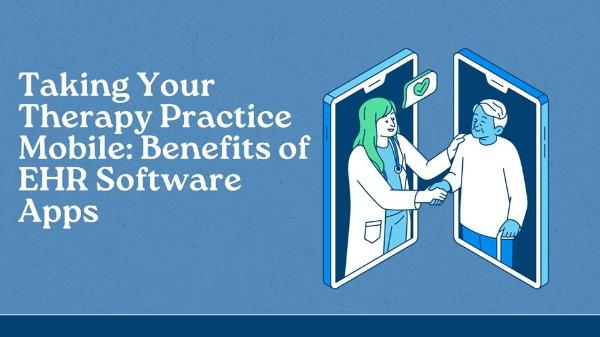Taking Your Therapy Practice Mobile: Benefits of EHR Software Apps
As a therapist, you know how crucial it is to provide top-notch care to your clients while efficiently handling the aspects of your practice. In this era of leveraging technology can be the secret sauce to achieving these objectives. Electronic Health Record (EHR) software applications are revolutionizing the way therapists deliver care offering perks that can streamline operations, boost patient involvement and enhance overall practice management. If you're considering transitioning your therapy practice to digital platforms, this article will address your queries and showcase the benefits of utilizing EHR software applications.
The Mobile Revolution in Healthcare
The healthcare industry has been undergoing a significant digital transformation, and mobile technology has played a pivotal role in this evolution. Smartphones and tablets have become indispensable tools for both healthcare professionals and patients, enabling seamless communication, real-time data access, and improved care coordination.
Patients expect convenient access to their healthcare information and the ability to communicate with their healthcare providers effortlessly. EHR software apps cater to these expectations by providing a user-friendly platform that allows patients to schedule appointments, access their medical records, and communicate with their therapists from the comfort of their mobile devices.
What is EHR?
Electronic Health Records (EHRs) are digital versions of patients' medical histories and health data. EHRs replace paper records, offering improved accessibility, security, and care coordination. EHR software apps allow healthcare providers like therapists to access and manage patient records from mobile devices.
Benefits of EHR Software Apps for Therapists
Embracing technology as a therapist can truly transform how you provide care and run your practice. In the above section, you saw “what is EHR”. Its applications come with a range of advantages, such as improved flexibility, increased involvement, and greater efficiency, in managing your practice. By utilizing these tools you can streamline your processes, enhance care coordination and meet regulatory requirements effectively. Discover the benefits that EHR software apps can offer to your therapy practice.
- Increased Mobility and Accessibility
One of the most significant advantages of EHR software apps is the ability to access patient records from anywhere, at any time. With a few taps on your mobile device, you can instantly retrieve a client's medical history, treatment plans, and progress notes, ensuring that you have all the necessary information at your fingertips during appointments or consultations.
Traditional paper-based documentation can be time-consuming and prone to errors, whereas EHR software apps simplify the documentation process. EHR software apps simplify the documentation process by allowing you to record patient notes, treatment plans, and progress updates directly on your mobile device. This streamlined approach not only saves time but also ensures accurate and legible records, minimizing the risk of misinterpretation or mistakes.
- Enhanced Patient Engagement and Communication
EHR software apps often include secure messaging and video conferencing features, enabling seamless communication between therapists and clients. This functionality is particularly beneficial for patients who may have mobility issues or live in remote areas, as it eliminates the need for physical appointments and allows for virtual consultations.
Many EHR software apps offer patient portals where clients can access their medical records, view appointment schedules, and even complete pre-appointment questionnaires or assessments. These self-service features not only empower patients to be more involved in their care but also reduce administrative burdens for therapists and their staff.
- Improved Practice Management and Efficiency
EHR software apps typically include scheduling and appointment management tools, allowing you to easily organize your calendar, schedule appointments, and send automatic reminders to clients. This streamlined process can help reduce no-shows and improve overall practice efficiency.
Integrated billing and claims management features within EHR software apps can significantly simplify the revenue cycle management process. With the ability to submit claims electronically, track payments, and generate invoices, you can ensure timely reimbursements and maintain a healthy cash flow for your practice.
Many EHR software apps offer robust analytics and reporting capabilities, providing you with valuable insights into your practice's performance. You can track patient progress, identify areas for improvement, and make data-driven decisions to enhance the quality of care and optimize your practice's operations.
- Compliance and Security Considerations
EHR software apps designed for healthcare professionals are typically compliant with the Health Insurance Portability and Accountability Act (HIPAA) regulations, ensuring the secure storage and transmission of sensitive patient data. These apps often employ advanced encryption and authentication measures to safeguard patient privacy and protect against unauthorized access or data breaches.
Reliable EHR software apps offer robust backup and disaster recovery solutions, ensuring that your practice's critical data is protected against hardware failures, natural disasters, or other unforeseen events. This feature provides peace of mind, knowing that your valuable patient records and practice data are secure and can be easily restored.
Selecting the Right EHR Software App
With a wide variety of EHR software apps available on the market, selecting the right solution for your therapy practice can seem daunting. Here are some key factors to consider:

User-Friendly Interface and Intuitive Design
Look for an app with a clean, intuitive user interface that is easy to navigate and requires minimal training. A well-designed app can improve user adoption and productivity, ensuring a seamless transition for you and your staff.
Customization and Scalability
Because your therapy practice is unique, ensure your EHR software app can adapt to your specific needs. Consider an app that offers customizable templates, workflows, and reporting capabilities, allowing you to tailor the software to your practice's requirements. Additionally, ensure that the app is scalable, accommodating an increasing number of clients and practitioners as your practice grows.
Integration and Interoperability
In today's connected healthcare ecosystem, it's essential to choose an EHR software app that can seamlessly integrate with other systems and applications you may be using, such as practice management software, billing systems, or third-party diagnostic tools. Interoperability ensures a smooth flow of data and minimizes the need for manual data entry or reconciliation.
Vendor Reputation and Support
When evaluating EHR software apps, consider the vendor's reputation, track record, and customer support offerings. Look for a provider with a proven track record of delivering reliable and user-friendly solutions, as well as responsive and knowledgeable support staff to assist you with any questions or issues that may arise.
Frequently Asked Questions
- Are EHR software apps secure and HIPAA compliant?
Yes, reputable EHR software apps are designed to comply with HIPAA regulations, ensuring the secure storage and transmission of sensitive patient data. They typically employ advanced encryption, authentication measures, and robust backup and disaster recovery solutions to safeguard patient privacy and protect against data breaches.
- Will I need to invest in additional hardware or infrastructure?
Most EHR software apps are cloud-based, which means you can access them from any internet-enabled device, such as a smartphone, tablet, or laptop. This eliminates the need for expensive on-premises hardware or infrastructure, reducing your upfront costs and allowing for greater flexibility.
- How difficult is it to learn and use an EHR software app?
Modern EHR software apps are designed with user-friendly interfaces and intuitive workflows. While there may be a learning curve initially, many apps offer comprehensive training resources and support to ensure a smooth transition for you and your staff.
- Can EHR software apps integrate with other systems I'm currently using?
Yes, many EHR software apps are designed to integrate seamlessly with other healthcare systems and applications you may be using, such as practice management software, billing systems, or diagnostic tools. This interoperability ensures a smooth flow of data and minimizes the need for manual data entry or reconciliation.
- What should you consider if you need to switch to a different EHR software app in the future?
Most reputable EHR software providers offer data migration services, allowing you to transfer your patient records and practice data to a new system if needed. However, choosing a vendor with a strong track record and a commitment to customer support is essential to minimize disruptions and ensure a smooth transition.
Conclusion
As a therapist, incorporating technology into your practice can make a significant difference in providing top-notch care to your clients while enhancing your practice's efficiency. Electronic Health Record (EHR) software applications offer advantages, such as improved flexibility and accessibility, increased patient involvement, and better practice management. This blog post aims to address concerns and emphasize the benefits of using these apps, equipping you with the knowledge to wisely decide on making your therapy practice mobile. Remember that choosing the EHR software app can greatly enhance your practice and meet the changing needs of your clients in this digital era.

